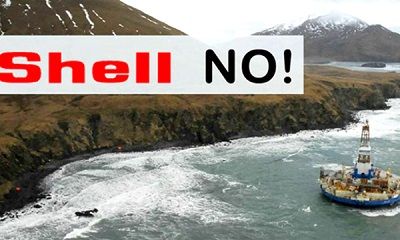
Shell’s path to drilling in the Arctic is lined with pitfalls. Photo credit: Alaska Wilderness League
Poor Shell Oil can't get any relief in their quest to destroy the Arctic Ocean for shareholder profit.
EcoWatch has reported that Shell Oil's preemptive lawsuit against environmentalists to block any potential lawsuits against groups who oppose its drilling operations was thrown out of court.
Two years ago, Shell filed a preemptive lawsuit against 13 environmental, indigenous and community groups to prevent them from possibly suing Shell at some time in the future over its plans to drill for oil in the Arctic. The 9th Circuit Court panel yesterday called the legal maneuver “novel”and said that it was unconstitutional.
“Big News! David has taken down Goliath!” the Alaska Wilderness League posted on their Facebook page. “Shell tried to bully environmental groups like the Alaska Wilderness League by preemptively suing us to silence our voice. The Ninth Circuit Court of Appeals, however, has officially told the oil giant: Shell NO! That behavior won’t fly!”
Shell acquired leases for oil exploration in the Chukchi and Beauford seas off Alaska, following the 2011/2012 approval of its oil spill amelioration plans by the U.S. Bureau of Safety and Environmental Enforcement (BSEE). The company was arguing that since the environmental groups were sure to challenge the approvals, it wanted to have the courts declare the approvals legal, in essence winning its case before the case was filed against it.
“Shell claimed that it needed a swift determination of the legality of the approval so it could conduct exploratory drilling without worrying that the environmental groups would seek to overturn the Bureau’s approval of the spill response plans,” the panel pointed out in their decision. “Shell’s lawsuit represents a novel litigation strategy, whereby the beneficiary of agency action seeks to confirm its lawfulness by suing those who it believes are likely to challenge it.”
“Shell may not file suit solely to determine who would prevail in a hypothetical suit,” the judges found.
“The environmental groups were ‘aggrieved’ by the approval of Shell’s oil spill response plans, and the Bureau is the federal agency responsible for their approval,” said the panel. “Because its plans were approved, Shell was not ‘aggrieved’ by the Bureau’s actions. Moreover, since Shell is not a federal agency, it cannot possibly have any legal obligations under the APA to the environmental groups.”
snip
While Shell said they believed this was a valid use of the legal system, advocacy groups were concerned that if Shell had prevailed, it would have had a silencing effect on a wide range of activist, citizen and community groups fearing expensive lawsuits from powerful corporate entities.
“Shell’s lawsuits against Oceana and our partners attempted to circumvent the constitution,” said Oceana deputy vice president Susan Murray. “Shell, one of the largest corporations in the world, sued nonprofit organizations on the grounds that the groups would dare speak out against the company’s proposals and use the courts to have that opposition heard when all other avenues had been exhausted without fair resolution. Today’s decision makes clear that Shell’s intimidation tactics will not stand. It is time for Shell to face the facts and take a step back in the Arctic.”
Chuck Clusen of the Natural Resources Defense Council, also a defendant in the case, said, “Shell was attempting to quash dissent and circumvent due process. It didn’t work—our legal system prevailed. As multiple accidents have already shown, Shell’s drilling plans in the Arctic are severely flawed. Shell is not equipped to handle offshore drilling in some of the world’s most treacherous waters, and we’ll continue to do all we can to stop them from endangering the precious wildlife and local fishing economies that they’re putting at risk.”
This is wonderful news as the ruling will make the fossil fuel corporations with their reckless destructive goals to extract every fossil fuel from the earth has been reined in.


